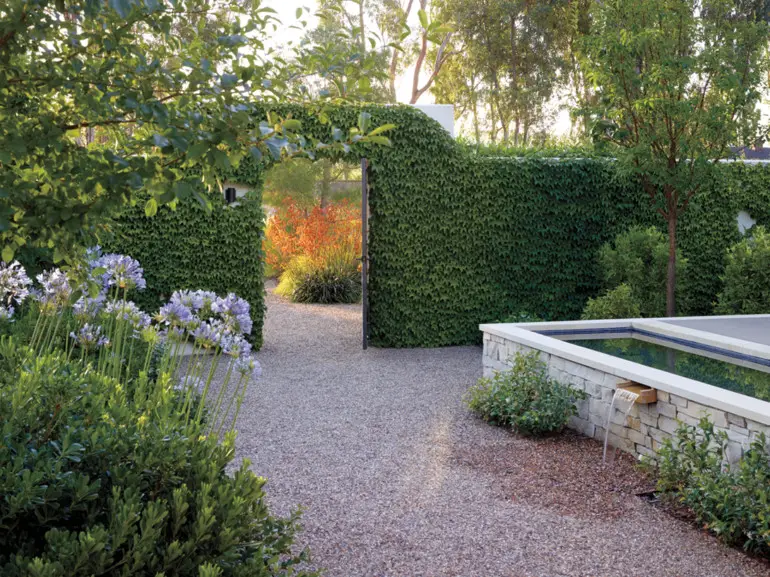Landscape architect Michael Lucas was inspired by a western wilderness in Sonoma, where he created a California mission-style walled garden.
“I DON’T MISS THE CITY AT ALL,” Marilyn Coon Stocke, a former schoolteacher who is now a bookkeeper in Sonoma, says. “I have a become a country girl.”
Her transformation began inadvertently nearly six years ago, when her architect, George Bevan, invited Healdsburg-based landscape architect Michael Lucas to help design her weekend garden.
Stocke had owned six neglected acres of Sonoma farmland for 15 years and was finally ready to build north of Sausalito, where she lived. Over the years, she had begun to love her patch of Sonoma, even though, with it being so close to tidal flats, the groundwater is boron-infused and, without a sheltered courtyard — let alone a house — her property was too windy to inhabit on most afternoons.
Luckily, when Lucas came on board, Bevan hadn’t yet designed her house, and the 19th-century Mission San Francisco Solano, which is minutes away, became a font of ideas for ways to live indoors as well as outdoors. Inspired by what they saw there, Lucas and Bevan, who have frequently worked together, toyed with a paradise garden theme and arrived at a master plan: an enclosed 2,500-square-foot walled garden sheltered in part by an equally large L-shaped house.
“Marilyn’s property was full of tumbleweeds and decrepit,” Lucas recalls. Overrun with weeds, poison oak and the remnants of on old pear orchard, it was “spooky, but it still had a sense of place and a certain mystique.”
Clearing fire-prone brush became a priority, but native oaks and eucalyptus trees growing on the site, a safe distance from where the house now stands, were saved.
The garden walls as well as the house, like the mission, are finished with low-cost white stucco. In the center of the courtyard Lucas fashioned an arresting 25-foot-long by four-foot-wide concrete reflecting pool, edged sparingly with more durable white Wisconsin limestone that echoes early western watering troughs for horses.

“We also had to create places to sit in the shade,” Lucas says. So Bevan organized rooms that open onto covered patios and decks for outdoor dining.
Two-foot-high raised rubble-and-concrete patios form an L. The larger section has seating that overlooks the water feature, and off the kitchen door is a smaller area for daily dining. A few steps down, a section covered with gravel contains a barbecue and a large trellis under which Stocke can seat four to 12 guests, her ideal numbers. Nearby, a fire pit offers warmth on cool evenings.


In back, a breezeway leads to winter ponds and a gravel mulch path, a large eucalyptus bench, stepping-stones and large granite boulders.
In sum, the courtyard that the Healdsburg firm Lucas & Lucas created is its own universe, visible from virtually every room in the house and large enough to accommodate as many as 50 guests in its many enclaves. Its plantings from 2013 have grown large and lush, all carefully irrigated with 10,000 gallons of fresh water trucked in monthly during summer. That costs about $450 a month but is worth it. Star jasmine forms a fragrant ground cover while olive, ornamental pear and black Mission fig trees, agapanthus plants, red roses and what Lucas calls “straight-up everyday lush-looking plants” thrive.

Beyond the walls, kangaroo paw, Australian rosemary, acacias, dwarf olives, a variety of grasses, salvias and aloes, as well plants that attract hummingbirds, hold sway. They are all hardy, but some plants such as coastal rosemary simply did not survive the first winter or fell prey to gophers and moles. Luckily, agaves, which those burrowers particularly love, are self-perpetuating and grow back.

“All I wanted was a wind-breaker. I didn’t plan to have a courtyard but I am so glad that’s the way it turned out,” Stocke says. “The courtyard is a marvelous oasis and a pleasant surprise for anyone who walks past the drought-resistant plants into a garden with a water feature and green walls. It is fun to see their reactions.”
With the effort it takes to maintain such a garden, it is as if Stocke and her husband, Roland, who during weekends is quite hands-on with pruning and caring for the grounds, are both latter-day pioneers. She now lives there full-time and they will both retire there someday.
“When I come home from work I walk the property and check where gophers might have gotten in,” Stocke says. “There are other pests like rabbits to contend with. It is always a maintenance dance.” Having lived in Australia, she is particularly wary of jackrabbits. Deer, a nuisance in neighboring vineyards, luckily keep to the periphery, within the thicket of oaks, eucalyptus and the last of the pear trees.
“At some point we may wonder what we are doing, but not now,” Stocke muses. “It is a lot of work, but I am so happy here.”
Resources
LANDSCAPE DESIGN Lucas & Lucas Landscape Architecture, landscape architect Michael Lucas, lucas-lucas.com
This article originally appeared in Spaces’s print edition under the headline: “Paradise Calling”

